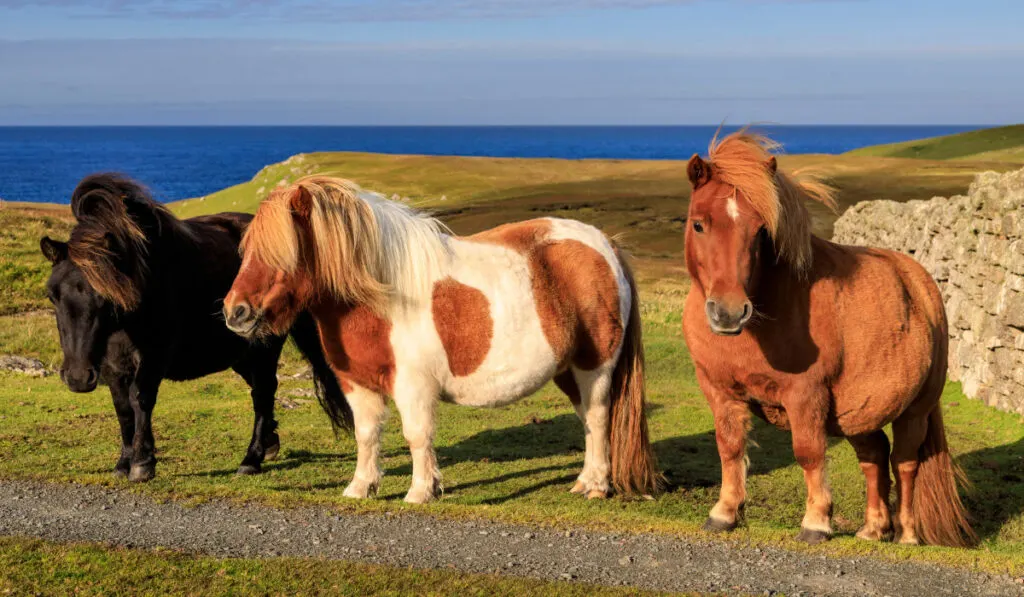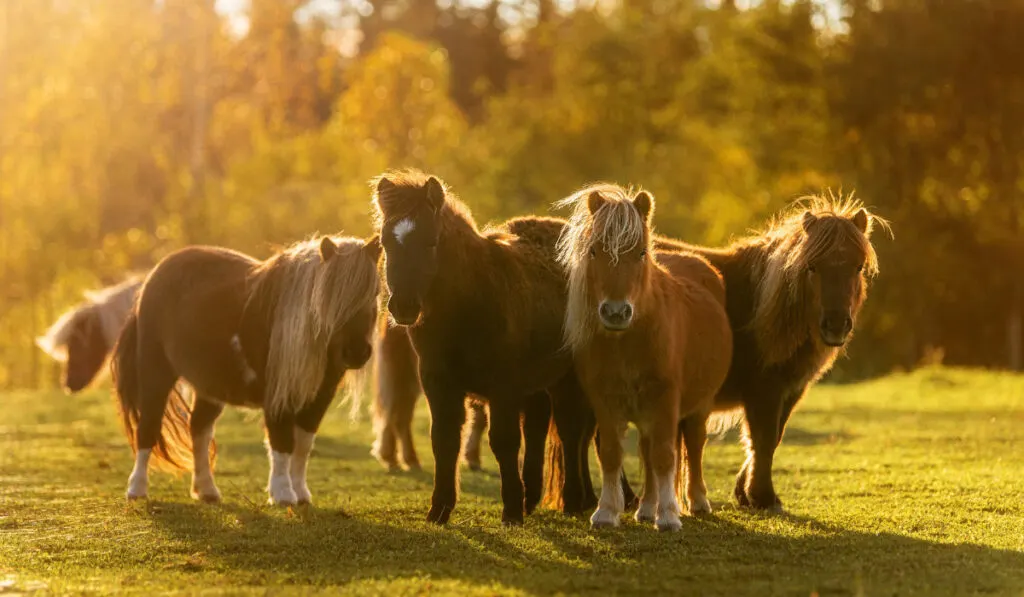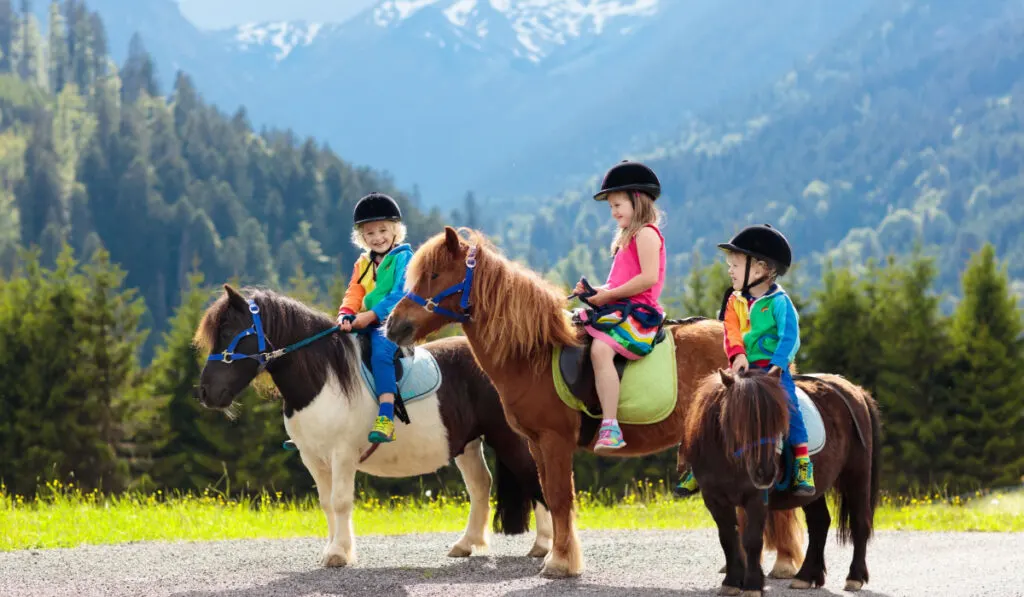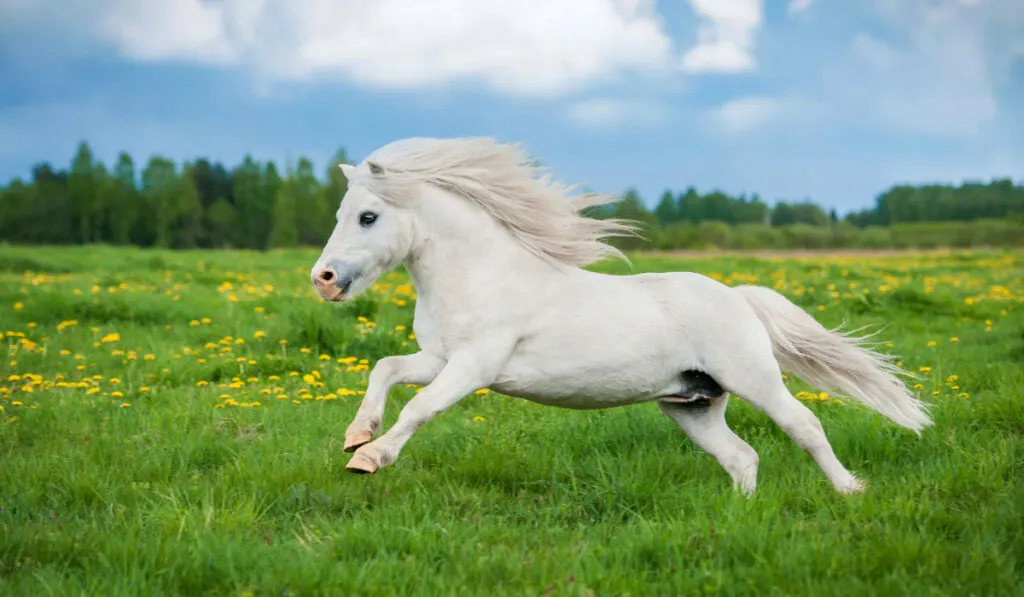If you’re a pony lover, you’re sure to love Shetland ponies. They are beautiful, calm, hardy, and have many uses. Shetland ponies are found worldwide as domesticated ponies.
In this article, we will review the Shetland pony breed. We will discuss the Shetland pony breed history, characteristics, uses, and popular books with Shetland ponies.

What are Shetland ponies? If you have ever visited a horse show or you were trained to ride horses when you were young, you’ve probably seen a Shetland pony.
Shetland ponies are strong ponies that stand at a height of 42.5 inches. Shetland ponies come in multiple colors. With a mild temper and a hardy breed, Shetland ponies are generally safe for your children with proper training.
Table of Contents
What is a Shetland Pony?
Shetland ponies are Scottish ponies that originated from the Shetland Isles in North Eastern Scotland. They can be used for riding by children, driving, showing, etc.
Inhabitants of the Shetland Isles produced this breed by crossbreeding local stocks with ponies brought in by Norse settlers.
Today, Shetland ponies can be found at carnivals, fairs, and other tourist attractions.
Shetland Pony Breed History
As stated earlier, Shetland ponies were produced by the natives of the Shetland isles who crossbred their native stocks with imported ponies.
The Shetland pony breed was influenced by the Celtic pony breed which settlers brought to the Shetland isles between 2000 and 1000 BCE.
Shetland ponies were first used to pull carts and carry loads such as coal, peat, and other items. They were also used to plow the land.
During the industrial revolution, coal mine workers in Britain and the Eastern United States employed Shetland ponies as underground ponies that hauled coal for their entire life.
In 1971, the United States closed its last pony mine.
Some horse breeds that have been produced from (or influenced by) the Shetland pony breed are:
- Deutsches Classic Pony (Germany)
- Pony of the Americas (United States)
- American Shetland Pony (United States)
Breed Characteristics

Temperament
Shetland ponies are calm, gentle, independent, and headstrong. If you properly train your Shetland ponies, they will be gentle and cooperative. Wild Shetland ponies can be headstrong.
Build
You can identify Shetland ponies simply by looking at them. Here are some details of the Shetland pony build:
- Small ears
- Small head
- Heavy winter coat
- Widely spaced eyes
- Short muscular neck
- Thick and long mane and tail
Colors
The Shetland pony has many recognized colors. Some common Shetland pony colors are:
- Bay
- Black
- Chestnut
- Dark brown
Many Shetland ponies have white or dark patches. Some Shetland ponies can also have a diluted color called Silver Dapple.
Height
Adult Shetland ponies can stand at a height of 42.5 inches (108 cm). The shortest height of adult Shetland ponies is 28 inches (71 cm).
Health
The Shetland pony breed is a hardy breed. Due to the harsh climatic conditions and scarcity of food in the area which Shetland ponies originated, they are built to withstand harsh weather and hunger. Shetland ponies have a heavy coat that helps them stay warm in winter.
Shetland Pony Registries
The major registry for traditional Shetland ponies is the Shetland Pony Stud-Book Society (SPSBS). If you live in the United States, you can register your Shetland pony with the following registries:
- American Shetland Pony Club (website)
- Shetland Pony Society of North America (website)
Common Uses / Disciplines

Shetland ponies today are mostly ridden by children and shown in horse shows. Instructors use Shetland ponies to teach children in harness driving classes.
They can also be found in carnivals and fairs. In the United States, some people use the Shetland pony breed as guide horses to guide blind people just like guide dogs.
Shetland ponies make great pets for children. Make sure that a Shetland pony is properly trained before you purchase it for your kids.
Prices of Shetland Pony
The price of Shetland ponies ranges from $500 to $1500. Shetland pony breeders or Shetland ponies with a purebred history are more expensive than regular Shetland ponies.
Cool Shetland Pony Facts
They are the Smallest Pony Breed in Britain
With a standing height of 42 inches, Shetland ponies are the smallest ponies in Britain. Other ponies found in Britain are:
- Dales pony (52 inches)
- Eriskay pony (54 inches)
- Exmoor pony (49 inches)
- Highland pony (58 inches)
- New Forest pony (58 inches)
Shetland Ponies Outnumber Shetland Islanders By Over 4 to 1
As of 2018, Shetland islanders were around 23,000 in population. In the world today, there are about 100,000 Shetland ponies. In the Shetland isles, there are over 1000 Shetland ponies with 170 horse owners.
The Best Shetland Pony Breeders are in the Shetland Isles
The best breeders are kept on the island while others are exported out of the isles. This means that the Shetland isles are the best place to get a Shetland pony.
Many Shetland Ponies Roam Freely in the Shetland Isles
Though they are not wild, many Shetland ponies owned by local crofters roam freely in the Shetland isles. If you visit the Shetland isles, you will see a lot of them.
They Live for 20-30 years
Unless they die of diseases or other factors, Shetland ponies can live to be 20-30 years old. It is not usual for a Shetland pony to live for more than 30 years.
Popular books with Shetland Ponies

Sheltie the Shetland Pony By Peter Clover
In this book, a Shetland pony called Sheltie is the best friend of a girl named Emma. Emma hated to move into the country until she met Sheltie who has a sense of fun. Emma accepts the country because of Sheltie and they become best friends.
Haki the Shetland Pony By Kathleen Fidler
Before Haki met Adam his owner, Shetland ponies were not known to act, dance, or respond to some sounds. Adam trains Haki, a very smart Shetland pony, to do those things. Haki and Adam become inseparable, but Adam faces the challenge of selling Haki when he plans to move off of the island.
Little Prince: The Story of a Shetland Pony By Annie Wedekind
Dauphin is a rich pampered Shetland pony that leads the perfect life in the city’s posh stables. Dauphin has won several trophies for his young owner, Isabella. He is called the prettiest pony in the city. After an unexpected turn, Dauphin’s life gets turned upside down when he is taken to a farm in the middle of nowhere. He, however, discovers the meaning of love, life, and family at the farm.
Sheltie Finds a Friend By Peter Clover
Do you remember Sheltie the Shetland pony’s best friend of Emma? Sheltie has a new donkey friend named Mudlark who belongs to Marjorie Wallace. One morning, Mudlark disappears while Marjorie is on vacation. It is up to Sheltie and Emma to find Mudlark before Marjorie returns.
Scott the Braveheart By Jenny Oldfield
Scott is a motherless young pony. One holiday in Scotland, twins named Helen and Hannah spot little Scott tethered and weak by the side of the road. It is up to Helen and Hannah to discover why Scott was abandoned.
Conclusion
The Shetland pony breed is a cute horse breed that comes in multiple colors. Shetland ponies are calm and gentle but can be stubborn if you do not train them.
Because of their personality and disposition, people have written many books about the Shetland pony. They are very hardy ponies that can withstand harsh climatic conditions as well as hunger.
Sources:
- https://en.wikipedia.org/wiki/Shetland_pony
- https://www.shetland.org/things/explore-nature/shetland-ponies
- https://www.britannica.com/animal/Shetland-pony
- https://shetlandponyclub.co.uk/are-shetland-ponies-good-for-children-tv230/
- http://www.shetlandponystudbooksociety.co.uk/about-the-breed

